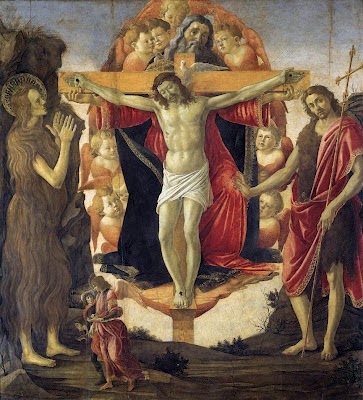Sandro Botticelli, Holy Trinity, Courtauld Institute, London, 1491-9
Holy Cross Day
September 14, 2014
Click to go immediately to:
1) The Music Programme Homepage
_______________
Crux fidelis, by different composers, is the motet three times this coming Sunday.
Crux fidelis, inter omnes arbor una nobilis: nulla silva talem profert, fronde, flore, germine. Dulce lignum, dulces clavos, dulce pondus sustinet.
Faithful cross, above all other, One and only noble tree: None in foliage, none in blossom, None in fruit thy peer may be. Sweetest wood and sweetest iron, Sweetest weight is hung on thee!
_______________
Crux fidelis is the eighth stanza of Pange Lingua Gloriosi Proelium Certaminis.
Pange Lingua Gloriosi Proelium Certaminis (Sing, my tongue, the Savior's glory; tell His triumph far and wide) [Latin and English text] is a sixth-century Latin hymn generally credited to the Christian poet, St. Venantius Fortunatus, Bishop of Poitiers, celebrating the Passion of Christ. In the Catholic Church, the first five stanzas have been used at Matins during Passiontide in the Divine Office, with the remaining stanzas (beginning with Lustra sex) sung at Lauds. Both parts are chanted during the Adoration of the Cross on Good Friday.
The whole hymn is sung during the ceremony of the Adoration of the Cross on Good Friday, immediately after the Improperia or "Reproaches", but in a peculiar manner, the hymn being preceded by the eighth stanza (Crux fidelis) while the stanzas are followed alternately by the first four and the last two lines of the (divided) eighth stanza (Crux fidelis).
_______________
It is generally argued that this hymn later inspired Thomas Aquinas (1225-1274) to write the hymn Pange Lingua Gloriosi Corporis Mysterium [Latin and English text] for the Catholic Feast of Corpus Christi.
This hymn is considered the most beautiful of Aquinas’ hymns and one of the great seven hymns of the Church. The rhythm of the Pange Lingua is said to have come down from a marching song of Caesar’s legions: “Ecce, Caesar nunc triumphat qui subegit Gallias.” Besides the Solemnity of Corpus Christi, this hymn is also used on Holy Thursday. The last two stanzas make up the Tantum Ergo (Down in Adoration Falling) that is used at Catholic Benediction of the Blessed Sacrament. (Preces-latinae.org)
Pange Lingua Gloriosi Corporis Mysterium [Latin and English text], sung by the Choir of Downside Abbey [musicMe]
______________
Pange Lingua Gloriosi Proelium Certaminis is incorporated into the prologue of Gustav Holst's Hymn of Jesus.
Gustav Holst, The Hymn of Jesus, H140, [text], performed by the Choristers of St. Paul’s Cathedral Choir, London Symphony Chorus & London Philharmonic Orchestra [musicMe]
_______________
Ecce lignum crucis is the Anthem at Evensong this coming Sunday as well as the organ postlude.
Ecce lignum crucis, in quo salus mundi pependit. Venite adoremus!
Behold the wood of the cross, on which hung the salvation of the world. Come, let us adore!
On Good Friday, in Catholic celebrations, Ecce lignum Crucis, sung with the gradual unveiling of the Cross, opens the Adoration of the Cross.
____________
The closing hymn of Evensong this coming Sunday, As royal banners are unfurled, is an English version of Vexilla regis.
_______________
Charles Tournemire, L'orgue mystique: Cycle after Pentecost, Op. 56: No. 40
Mass of the 14th Sunday after Pentecost
_______________
Vincent van Gogh, The Good Samaritan (After Delacroix), Rijksmuseum Kröller-Müller, Otterlo, Netherlands, 1890
Bach Cantatas for the Thirteenth Sunday after Trinity:
Click to go to Johann Sebastian Bach, Allein zu dir, Herr Jesu Christ / Alone towards you, Lord Jesus Christ, Cantata 33, with performances by Gardiner, Koopman, Leonhardt, Leusink and Richter.
Click to go to Johann Sebastian Bach, Du sollt Gott, deinen Herren, lieben / You must love God, your Lord, Cantata 77, with performances by Koopman, Leonhardt, Leusink and Suzuki.
Click to go to Johann Sebastian Bach, Ihr, die ihr euch von Christo nennet / You, who take your name from Christ, Cantata 164, with performances by Gardiner, Koopman, Leonhardt and Leusink.
